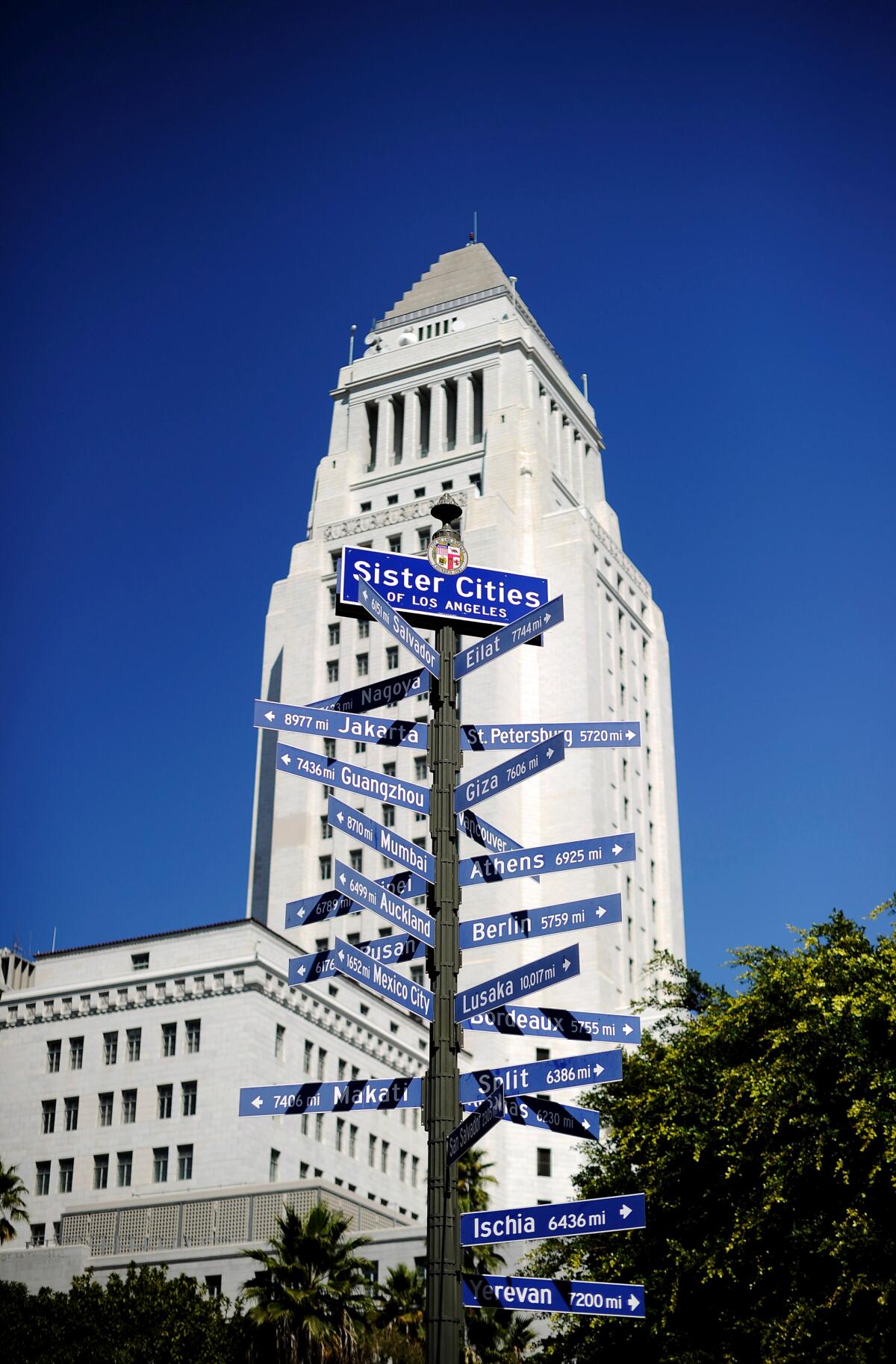It’s time to end our sister city relationships with Russia

- Share via
In 1956, President Eisenhower faced a new kind of threat to world peace. The postwar balance of power between the United States and the Soviet Union led to the emergence of regional proxy wars, international espionage and the constant threat of nuclear annihilation. The Cold War required a different approach to diplomacy, one that leveraged interpersonal relationships as a means around the intransigence of adversarial governments.
One of Eisenhower’s strategies was novel: the establishment of a “sister city” program in which local government leaders could serve as citizen diplomats and share ideas and information to deepen cultural understanding. These exchanges between cities essentially created dozens of localized lower-level diplomatic connections beneath the intractable threatening postures of the great nuclear powers. The sister cities program has widely been considered a great success because it used grassroots leadership to affect international outcomes. We stand at a similar moment in time.
Last week, Ukrainian President Volodymyr Zelensky spoke remotely to the U.S. Conference of Mayors in Reno and described a new geopolitical framework that requires a new set of solutions. Instead of a world defined by nation states, we live in an era where social networks can spur political movements, a world in conflict over human values where individual voices can have a measurable impact.
Zelensky urged American mayors to cut ties with Russian cities. “Please don’t let those who became murderers call your cities their sister cities,” he said. He was, in effect, asking local leaders in the U.S. to engage in the foreign policy process and send a personal and powerful statement to the Russian people that the horrendous actions of Vladimir Putin’s regime cannot stand. This is a concrete action our cities can take that would have a real impact.
Last month I was in Kyiv and Lviv to meet with academic researchers who have focused for years on influencing Russian public opinion. They told me that Putin will not retreat from Ukraine so long as he maintains strong levels of support among the Russian people for the invasion. They also noted that the loss of relationships — personal, economic, professional — is crucial in shifting Russian public opinion about the Putin regime. In fact, it was among the most effective actions that changed public opinion in a country where the media is state run and political protest comes with a jail sentence.
Renouncing a sister city relationship would show solidarity with the global fight against authoritarian threats. The U.S. government has already taken unprecedented action in the form of economic sanctions against Russia, the freezing of its currency reserve assets and the transfer of weapons to Ukraine’s military. The state of California is working to pull investments, including those of the largest pension fund (CalPERS), from Russian firms. Local governments should seize this opportunity to show their full support.
Fewer than a dozen California cities have formalized sister city relationships with Russian cities — but among them are some of the largest and most influential in the state, including Los Angeles (St. Petersburg), Long Beach (Sochi) and San Diego (Vladivostok). These cities should heed Zelensky’s call and renounce their sister city relationships with their Russian counterparts.
Like the new world Eisenhower faced, the current global conflict requires a new approach. We are not in a cold war and the solutions that worked then will not work now. Europe is in a land war for the first time since World War II. In the face of Russian aggression, rape, torture and executions as well as the senseless destruction of towns and cities, hospitals, schools and houses of worship, this moment calls for moral clarity.
American mayors can play a substantive role — as they did during the Cold War — by using their position as citizen diplomats to declare to the Russian public that the atrocities inflicted by their national government cannot coexist with business-as-usual relationships at any level.
The mutual exchange of ideas, culture and information among cities should always be the goal of diplomatic efforts. But to continue those relationships as we witness genocide and war crimes is tantamount to providing support.
Mike Madrid is a Republican political consultant, co-founder of the Lincoln Project and publisher of California City News.
More to Read
A cure for the common opinion
Get thought-provoking perspectives with our weekly newsletter.
You may occasionally receive promotional content from the Los Angeles Times.









